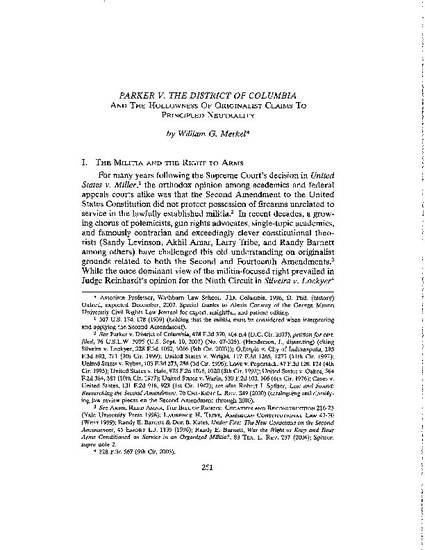
Article
Parker v. The District of Columbia and the Hollowness of Originalist Claims to Principled Neutrality
George Mason University Civil Rights Law Journal
(2008)
Abstract
For many years following the Supreme Court's decision in United States v. Miller,1 the orthodox opinion among academics and federal appeals courts alike was that the Second Amendment to the United States Constitution did not protect possession of firearms unrelated to service in the lawfully established militia. 2 In recent decades, a growing chorus of polemicists, gun rights advocates, single-topic academics, and famously contrarian and exceedingly clever constitutional theorists (Sandy Levinson, Akhil Amar, Larry Tribe, and Randy Barnett among others) have challenged this old understanding on originalist grounds related to both the Second and Fourteenth Amendments.3 While the once dominant view of the militia-focused right prevailed in Judge Reinhardt's opinion for the Ninth Circuit in Silveira v. Lockyer4 in 2003, the self-proclaimed standard model, favoring a purely private right to arms, won out in the Fifth Circuit's United States v. Emerson5 opinion in 2002 and in the D.C. Circuit's Parker v. District of Columbia6 decision earlier this year. The D.C. Circuit case is on appeal to the Supreme Court, which is expected to grant certiorari to resolve the split in the Circuits. The High Court is very likely to embrace the private rights reading of the right to arms by a 5-4 majority, and justify the decision on grounds of fidelity to the original understanding of the Second Amendment.
Keywords
- second amendment,
- state and local government,
- legal history
Disciplines
Publication Date
Spring 2008
Citation Information
William G. Merkel. "Parker v. The District of Columbia and the Hollowness of Originalist Claims to Principled Neutrality" George Mason University Civil Rights Law Journal Vol. 18 Iss. 2 (2008) p. 251 - 265 Available at: http://works.bepress.com/william_merkel/13/
